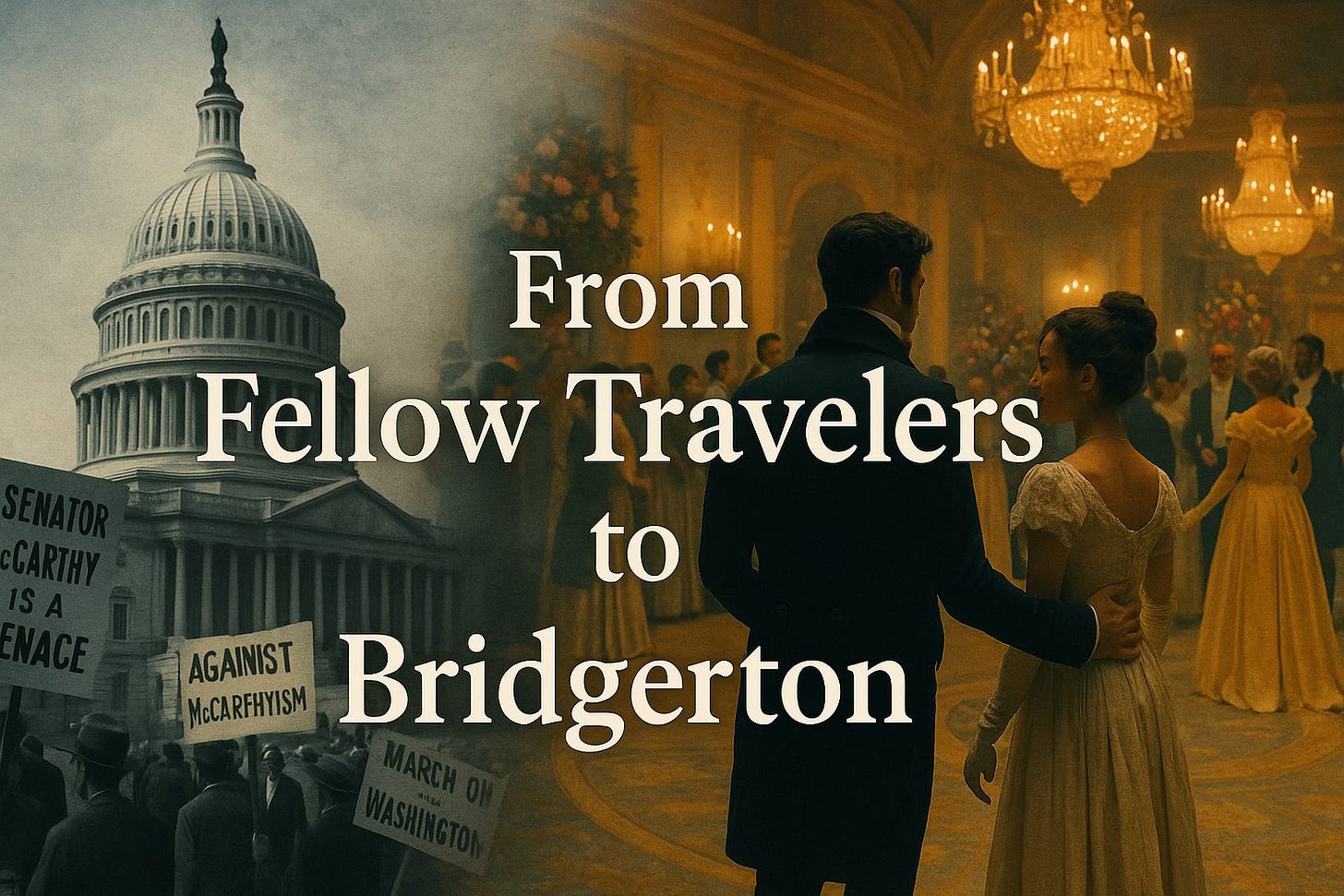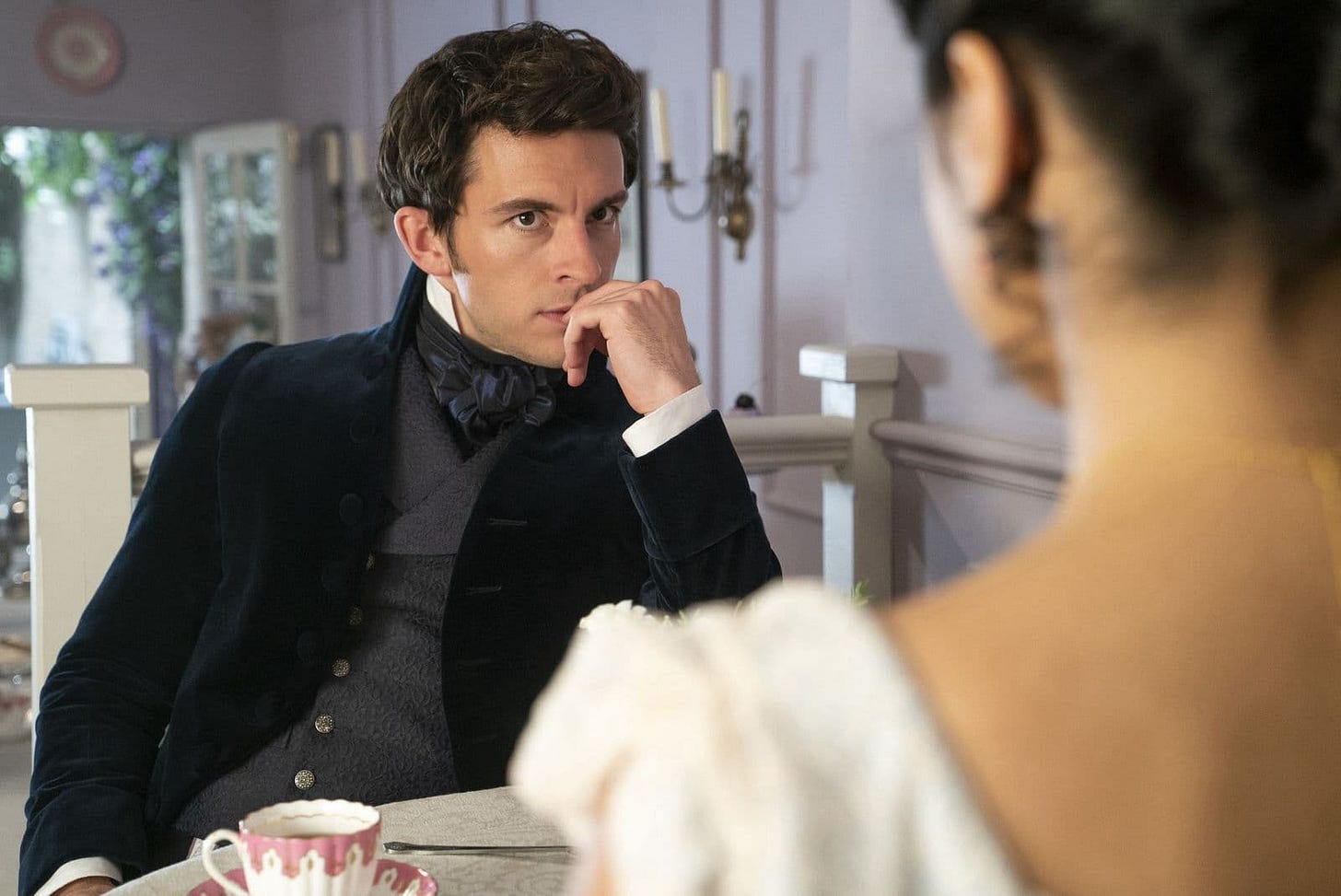Fellow Travelers to Bridgerton: The Closet, the Costume, and What Came After
Jonathan Bailey’s journey from secrecy to spectacle — from Fellow Travelers’ shadows to Bridgerton’s ballroom.
Originally published as “Fellow Travelers – The Closet, the Costume, and the Cohn Playbook.” Updated following Jonathan Bailey’s selection as People’s Sexiest Man Alive 2025.
Thomas Mallon’s Fellow Travelers is the kind of novel that lingers long after you set it down. A love story built in the shadows of McCarthy’s Washington, it asks what happens to desire when truth itself is criminalized.
When Showtime adapted it, I watched Jonathan Bailey as Tim laugh, ache, and break under the weight of secrecy — and for me, it wasn’t just historical fiction. It was recognition. If you haven’t seen it, it’s excellent, but Jonathan Bailey’s Tim was the scene stealer. This one of the most accurate depictions of intimacy between two men that I have ever seen on mainstream TV (just watch it - you’ll like it).
One queer period drama led me straight into another: from Mallon’s Washington to Shondaland’s Regency London. Strange as it sounds, the connection made sense.
From Fellow Travelers I found myself on a strange trajectory: straight into Bailey’s other work, including Bridgerton. Suddenly I was binging pastel-tinted Regency drawing rooms, catching up for the next season as if I had always been invested in who was marrying whom even crying during Penelope’s wedding. That’s the funny thing about cultural rabbit holes: one queer period drama can lead you to a straight Shondaland romance, and the through-line still makes sense.
Bailey’s Presence
Bailey’s Anthony Bridgerton isn’t gay. He’s straight, burdened with family duty, and more focused on marriage markets than secret trysts. But Bailey himself is openly gay. That matters.
It matters that one of the most visible romantic leads on Netflix is a gay man. In a world where Mallon’s characters would have been destroyed for exposure, Bailey thrives by bringing global audiences to swoon over his performance. That’s not incidental progress — that’s cultural tectonics.
And it matters, too, that Bridgerton is a Shondaland production. Shonda Rhimes’ empire has normalized representation for decades: interracial relationships, queer characters, ambitious women who don’t apologize. Even when the Bridgertons keep Benedict’s queerness as subtext rather than text, the point is that the space exists. The reimagined Regency world is inclusive by design, not by accident.
Jonathan Bailey’s Sweetheart Turn
Bailey has become more than the actor who pulled me into Bridgerton binges. In 2024 he launched The Shameless Fund, a U.K.–based charity that directs money toward LGBTQ+ causes. Among its first grants, two went to organizations supporting older LGBTQ+ people — a group he’s said are often forced to “go back into the closet” in care homes and later life.
“The first five grants we’ve given, two are going to charities that look after elderly LGBTQ+ members … having to go back in the closet …” — Jonathan Bailey, Time interview
That sentiment lands like an echo of Fellow Travelers. The characters in Mallon’s novel are fictional, but the lives they represent were real — men and women crushed by paranoia, erased by policy, and erased by history. Bailey’s reminder is that they shouldn’t be forgotten.
It’s also personal for me. I know what it’s like to hide, to lose love in silence. I know what it’s like to live in a world where the masks felt permanent. His words, and his work, feel like a hand reaching back through time — connecting past to present, reminding us that what’s possible now was paid for by lives lived in shadow.
The Ache and the Liberation
When I think about my own story — decades closeted, losing someone I loved before I could even name it love — these cultural leaps feel personal.
For years, I lived in silence, performing the role expected of me. Watching Bailey, I recognize both the ache of Fellow Travelers and the liberation of Bridgerton. The two aren’t opposites; they’re points on the same continuum.
Roy Cohn’s Ghost
But the politics that made Mallon’s novel so haunting aren’t ancient history.
McCarthyism wasn’t just a witch hunt against communists — it was a purge of “sexual deviants,” a federalized paranoia that destroyed careers and lives. Roy Cohn was the architect, whispering strategy into McCarthy’s ear. Later, he became Donald Trump’s mentor.
The methods he perfected in the 1950s — scapegoating, secrecy, turning fear into spectacle — are alive today. Watch the news. Listen to rallies. The vocabulary has shifted, but the rhythm hasn’t.
From HBO Satire to History
Which is why I keep circling back to the irony of this cultural moment. On the one hand, we have Fellow Travelers, laying bare the cruelty of enforced closets. We have Jonathan Bailey in Bridgerton, showing a gay actor embodying the world’s most streamed romance.
And then we have The Apprentice, the film tracing Trump’s rise under Roy Cohn’s tutelage — with Sebastian Stan playing Trump and Jeremy Strong as Cohn.
Strong already made our skin crawl in Succession. Kendall Roy was the heir you couldn’t stop watching — entitled, twitchy, corrupt, desperate. It was unsettling as fiction.
But in The Apprentice, Strong’s turn as Roy Cohn isn’t satire. It’s history. The grotesque real thing. The same ruthless hunger for influence, only this time it’s not HBO fantasy: it’s the man who taught Donald Trump his playbook.
Jeremy Strong as Roy Cohn isn’t casting against type — it’s prophecy fulfilled.
And that’s the scariest part of all.
Where We Are Now
What does it mean to live in this mash-up of past and present? For me, it’s both sobering and strangely hopeful.
The cruelty of secrecy hasn’t vanished, but visibility has multiplied. The same culture that once would have destroyed Jonathan Bailey now celebrates him. The same Hollywood that once closeted Rock Hudson now builds franchises around openly queer talent.
And yet, the political machine that crushed Mallon’s characters is still humming in new forms.
Which is to say: Fellow Travelers wasn’t just a gateway to Jonathan Bailey and a weekend lost to Bridgerton. It was a reminder. Our stories — closeted, lost, recovered, remade — aren’t relics of McCarthy’s Washington or Regency England. They’re alive, contested, shaping who gets to belong and who gets scapegoated.
And whether it’s McCarthy in 1953 or Trump in 2025, Roy Cohn is never far from the stage.
Sources / Links
Thomas Mallon, Fellow Travelers (Amazon | Bookshop.org)
Showtime’s Fellow Travelers series (sho.com)
Bridgerton on Netflix (Netflix)
The Apprentice - Movie (Amazon)
Frontline: “All About the Fight: How Donald Trump Developed His Political Playbook” (Frontline)
Variety on The Apprentice (2025 film, Sebastian Stan as Trump, Jeremy Strong as Cohn) (Variety)
As an Amazon Associate I earn from qualifying purchases.
Further Reading
If you like this series and are curious about books that have inspired me, I’ve curated a collection on Bookshop.org. Buying through that link supports independent bookstores—and it helps sustain this project.
Stay Connected
📖 Subscribe to Caleb Reed for weekly chapters and essays.
📸 Follow along on Instagram: @caleb_writes
📘 Facebook: Caleb Reed
🦋 Bluesky: @thecalebreed.bsky.social






OMG, after watching Jimmy Fallon announce him last night, I wrote an article about him. First the Queer movies, now Jonathan Bailey! Hahaha. I promise I'm not copying!
It's scheduled for tomorrow, but I'll add a link to yours if you're okay with it.
Omds thank you for this. I watched Fellow Travelers this past week, but I’d watched Bridgerton and Wicked before that. Fellow Travelers just gave me a new obsession with Jonathan Bailey, I can’t even explain it. I loved the series so much is all I’d say and his acting was so impressive especially included in the epicenter of what I’d watched before in his work